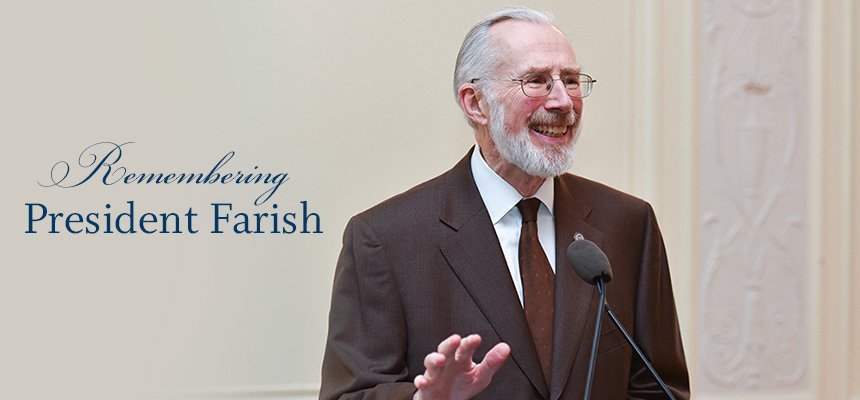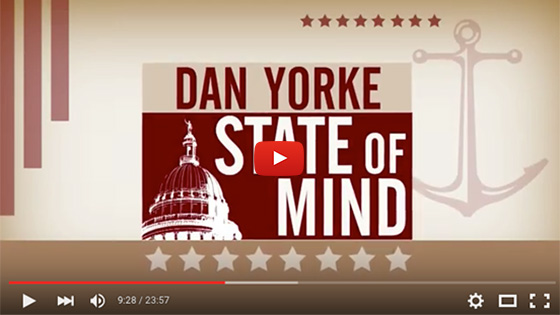
In His Own Words
President Farish served as a leading voice in the national dialogue on the most important issues facing higher education. Explore his ideas, in his own words, on topics including making college more relevant, more affordable and more accessible.
RWU Inaugurates President Farish, Oct. 13, 2011
The responsibility of college presidents now must be to articulate higher education’s role in creating agency for many of those who feel disenfranchised. My campus has promoted affordability by freezing tuition for the past five years and increasing financial aid 30 percent; created educational programs for such nontraditional students as prisoners on work-release, teenagers entering the juvenile justice system, and inner-city high schoolers; provided training for corporate employees; and instituted work-force-development programs for underemployed workers.
It’s time for college presidents to make a collective pledge to America to stand for social justice and the creation of opportunities for those whom higher education has traditionally excluded. It’s time we recommitted to having as our primary mission “to serve the public good.”
– The Specific Threats Now Facing Higher Education
Published in The Chronicle for Higher Education, Nov. 15, 2016
President Farish Discusses How RWU Creates Great Citizens
Our tagline at Roger Williams University is “a private university serving the public good.” If we are to be true to that commitment, we have no choice but to be in the front row of the vanguard of American universities that dedicate themselves to expanding college access to working adults and to those high school graduates who today are too often excluded.
– Rebuilding the American Economy
Published in Higher Ed in Crisis: A President's Blog, April 25, 2017
President Farish Discusses Supporting DACA on Dan Yorke State of Mind, December 2016
Colleges must dramatically increase graduation rates. It is unconscionable that colleges are graduating less than 20 percent of incoming freshmen in four years. Too many institutions act more as judges than advocates, more as inquisitors than mentors, more as auditors than teachers. And when students fall short, the conclusion is that they’re lousy learners – not that the institution is doing a poor job of teaching… We can provide far more guidance and assistance to students without compromising expectations of what and how they learn. We can enliven in-class and out-of-class instruction. We can move away from counting the hours a student must spend in a classroom and toward a direct assessment of learning outcomes.
– My Turn: Donald J. Farish: Colleges Must Change to Meet Society’s Needs
Published in the Providence Journal, Aug. 9, 2017
President Farish Shares the Way RWU is Creating Greater Access to Education
Higher Ed in Crisis: A President's Take

President Farish maintained an active blog examining the most pressing issues facing higher education.
In response to the executive order on immigration, statements of concern, a recommitment to core values and expressions of support for those imperiled are all expected and appropriate [from university presidents]. One method of modeling best practices for our students – and allowing them to see the democratic process in action – would be to create forums on campuses to discuss whether the current level of protection of our citizens from terrorist attacks is sufficient, and if not, what additional steps might be considered, weighing the balance between the degree to which safety would be enhanced versus the degree to which particular actions might actually increase the level of danger.
– Campus Civility in a Politically Charged Era
Published in Inside Higher Ed, March 3, 2017
President Farish Discusses RWU's New Job Preparation Program on Dan Yorke State of Mind, September 2015
By advocating for imprisoned scholars, students aren’t just learning the fundamental skills involved in research and advocacy. They aren’t just learning the intricacies and vagaries of international relations. They are learning to be citizens of the world.
This world needs people of good will who are committed to sustained action. We need people undeterred by the frustrating scarcity of easy solutions or quick results. We need people devoted to defending freedom of expression and fighting for freedom from oppression.
At a time when authoritarian rulers are clamping down on dissent, we need the next generation to shine a light in the darkest corners. In an era of rampant cynicism, we need a youthful burst of energy and optimism. This is the generation the world needs now. And it gives me hope.
– Students Fight to Free Prisoners
Published in Providence Journal, June 3, 2018


